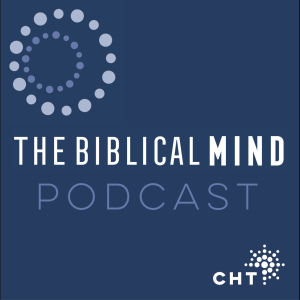The Biblical Mind
The Biblical Mind is dedicated to helping its audience understand how the biblical authors thought, promoting Bible fluency through curious, careful reading of Scripture. It is hosted by Dr. Dru Johnson and published by the Center for Hebraic Thought, a hub for research and resources on the intellectual world of the Bible.
The Biblical Mind is dedicated to helping its audience understand how the biblical authors thought, promoting Bible fluency through curious, careful reading of Scripture. It is hosted by Dr. Dru Johnson and published by the Center for Hebraic Thought, a hub for research and resources on the intellectual world of the Bible.
Episodes

Friday Aug 19, 2022
Friday Aug 19, 2022
This episode was originally published in July, 2021. We thought it was worth a reissue for our newer listeners.
If God is sovereign, what is the point of prayer? Is it merely a meditative exercise, or do our petitions shape the outcome of history?
Prayer is a ritual and relational device Christians use to communicate with God. God is open to the requests of all people everywhere and actually wants to bring mercy and blessings instead of judgment—but that doesn’t mean that the function of prayer is simple to understand. Prayer is a nuanced activity. In this conversation, Dru Johnson and John C. Peckham answer a variety of questions surrounding prayer. Does God hear the prayers of people outside of the lineage of Israel? Can God act in contradiction to His promises and His Word if we pray for it? Does a person's character affect how God answers their prayers?
Show notes:
0:00 Why pray to God?
3:33 What did the biblical authors think of prayer?
9:03 Effective prayers
14:25 Do we get all we pray for?
23:44 What is the role of hope?
Show notes by Serena Tuomi.
Credits for the music used in TBM podcast can be found at: hebraicthought.org/credits.

Friday Aug 12, 2022
The Dangers of Celebrity in the Church (Katelyn Beaty)
Friday Aug 12, 2022
Friday Aug 12, 2022
We live in a fame-saturated culture. Celebrity figures run our largest corporations, media entities, and megachurches. But the characteristics of celebrity—unquestioned authority, dynamic public personas, and tendency toward abuse—make it a dangerous feature in Christian churches. Recent stories about abusive, exploitative celebrity pastors have spotlighted this fact.
In this episode, Katelyn Beaty discusses her new book Celebrities for Jesus: How Personas, Platforms, and Profits Are Hurting the Church. She identifies the key features of fame and celebrity that infect every element of our culture and diagnoses their central issues, including secrecy, self-promotion, anger, and pride. She asks whether the business world has become the model for the church and whether the American church is unique in its elevation of celebrity pastors. The church needs to know the dangers of celebrity and find ways to remain accountable in its pursuit of the gospel.
Show notes:
0:00 Seeking versus receiving fame
2:14 Celebrity and self-promotion
4:48 When the platform becomes the point
9:00 Public personality and false intimacy
12:21 Billy Graham and the Modesto Manifesto
18:06 Anger, narcissism, leadership, and celebrity
21:35 Privacy versus secrecy
24:40 Church boards
28:23 American megachurches
34:21 Avoiding celebrity pastors
Show notes by Micah Long
Credits for the music used in TBM podcast can be found at: hebraicthought.org/credits.

Friday Aug 05, 2022
Forming Trauma-Safe Churches (Scott Harrower and Joshua Cockayne)
Friday Aug 05, 2022
Friday Aug 05, 2022
We hear the word "trauma" a lot today—but what does it really mean? For Christians who have experienced horrific, overwhelming, life-threatening events events, the church can be a place either of fear or of healing. In this episode, Scott Harrower and Joshua Cockayne discuss their new book Dawn of Sunday: The Trinity and Trauma-Safe Churches (written with Preston Hill). They examine attitudes and practices that help us recognize, accept, and respond to traumatized individuals within the church. As the church becomes a community of help and safety, and as its members grow in Christlikeness, it can become a haven for the traumatized and vulnerable.
Scott Harrower is a Lecturer in Christian Thought at Ridley College and an ordained Anglican minister. He writes on the history of early Christianity and philosophical issues such as the problem of evil. Joshua Cockayne is a Divinity Honorary Lecturer at the University of St. Andrews. His research focuses on spirituality and ecclesiology, and he works in the area of analytic theology.
Show notes:
0:00 Distinguishing trauma from other kinds of pain or distress
3:20 Commonplace horrors and their effects
5:35 Writing Dawn of Sunday
8:26 Seeing and responding to grief
11:38 Responsible practices for dealing with trauma
14:49 Making church a safe place
20:21 Symptoms of trauma
26:00 The church as a community of help
31:03 Aiding those who are experiencing ongoing trauma
Show notes by Micah Long
Credits for the music used in TBM podcast can be found at: hebraicthought.org/credits.

Friday Jul 29, 2022
Repentance in Deed and Word (Shalom Carmy)
Friday Jul 29, 2022
Friday Jul 29, 2022
We all desire repentance, forgiveness, and reconciliation. But these concepts are complicated, and seeing them from a Jewish perspective on biblical law can provide a fresh perspective to non-Jews. In this episode, the discussion of repentance and forgiveness continues with Rabbi Shalom Carmy and Dru Johnson. They distinguish between the action of repentance and the intention of repentance and question whether you can really reconcile without both. They also consider group forgiveness, and whether any one member of a group can facilitate reconciliation on behalf of the group. Growing in these practices, and doing them biblically, requires sustained and frequent reflection on their significance.
Shalom Carmy is Assistant Professor of Jewish Philosophy and Bible at Yeshiva University. He specializes in biblical interpretation and modern Jewish thought, and writes for several religious and Jewish publications. He previously wrote “And God Saw Their Deeds”: Biblical Repentance in Action (and Less So in Feeling) for The Biblical Mind.
Show notes:
0:00 Actions versus words
3:32 Repentance and forgiveness for groups
7:00 Forgiveness in the Holocaust
13:03 Commanding repentance
17:28 Yom Kippur
20:39 Regret, confession, and resolve
26:17 Progressing in repentance
28:08 The inner experience of reconciliation
32:27 What is real forgiveness?
Show notes by Micah Long
Credits for the music used in TBM podcast can be found at: hebraicthought.org/credits.

Friday Jul 22, 2022
Q&A Series: Is There Marriage in Heaven? (Dru Johnson)
Friday Jul 22, 2022
Friday Jul 22, 2022
From Genesis, marriage looks like it is one of the most important parts of creation. So, does Jesus really say in Luke 20 that there will be no "marrying and giving in marriage" in the new heavens and earth? In the first episode of The Biblical Mind Q&A series, Dru Johnson examines the phrase "marrying and giving in marriage" across Scripture—and what Jesus really meant by it.
In Luke 20, the Sadducees approach Jesus and ask about a woman who had multiple husbands. Jesus' response might seem to suggest that no one is married in the age of resurrection. Dru argues that Luke has in mind a broader, more subtle point about the resurrection and the end of the world.
Dru Johnson is the Director for the Center of Hebraic Thought, the host of The Biblical Mind Podcast, and an Associate Professor of Biblical and Theological Studies at The King's College. He is also the author of the recent book Biblical Philosophy: A Hebraic Approach to the Old and New Testaments.
Show notes:
0:00 Introduction—is there marriage in heaven?
2:43 Marriage as part of the structure of creation
4:10 Examining Luke 20
10:14 The purpose of Luke's gospel
14:35 Luke 17: "Marrying and giving in marriage"
21:21 Why Jesus isn't actually talking about marriage
Show notes by Micah Long
Credits for the music used in TBM podcast can be found at: hebraicthought.org/credits.

Friday Jul 15, 2022
Friday Jul 15, 2022
This episode previews the CHT's new book The Biblical World of Gender: The Daily Lives of Ancient Women and Men. Three of the authors from the book (Carmen Imes, Nijay Gupta, and Cynthia Shafer-Elliott) discuss their contributions. They touch on the gender assumptions in the ancient Near East and Roman Empire, along with some of the Bible's challenging passages about slavery and authority.
Carmen Imes is Associate Professor of Old Testament at Biola University and the author of Bearing God's Name: Why Sinai Still Matters. She has been a missionary to the Philippines and releases "Torah Tuesday" videos on her YouTube channel. Nijay Gupta is Professor of New Testament at Northern Seminary, Editor-in-Chief of the Bulletin for Biblical Research, and the author of Paul and the Language of Faith. Cynthia Shafer-Elliott is Associate Dean and Associate Professor in the School of Theology and Leadership at William Jessup University. She does archaeological research on ancient Israel, including households, food preparation, and gender dynamics in the family, and is an editor of the recent T&T Clark Handbook of Food in Ancient Israel and the Hebrew Bible.
Show notes:
Carmen Imes
0:00 Why we need to examine the biblical authors' view of gender
3:42 The "sanctified imagination" and entering into the biblical story
5:20 A selection from Carmen Imes's essay "Freedom Fighters of the Exodus"
Nijay Gupta
9:07 Understanding Paul's "harshness"
11:58 The biblical authors on the rape of slaves
14:15 Examples of radical early Christian ethics
16:26 Gender differences in the first-century Roman Empire
Cynthia Shafer-Elliott
18:48 The importance of household archaeology
21:19 Understanding the cultural assumptions of the biblical texts
25:44 Hierarchy versus heterarchy
Show notes by Micah Long
Credits for the music used in TBM podcast can be found at: hebraicthought.org/credits.

Friday Jul 01, 2022
ICYMI: How the Translation of ’Faith’ in the Bible Falls Short (Matt Bates)
Friday Jul 01, 2022
Friday Jul 01, 2022
This episode was originally published in March, 2021. We thought it was worth a reissue for our newer listeners.
Many of us have learned definitions of faith, belief, and trust that merely concern internal mental states. We say we believe something when we mentally affirm its truth, and we say we trust God when we believe what the Bible says. But these introspective forms of faith aren't really what the biblical authors have in mind when they talk about faith in the Bible. For them, faith is more of a full-bodied allegiance to Jesus, a commitment to serve and work alongside Him as our King.
In this episode, Dr. Matthew Bates talks to Dru Johnson about allegiance and faith in the Bible. They consider how, in the context of the Roman empire, the idea of loyalty in patron–client relationships shaped the way the biblical authors understood trust, authority, and honor. Along the way, they also discuss some of the biblical metaphors for salvation that are drawn from the social dynamics of the ancient world, and how the Hebrew Bible influenced the New Testament's view of power and authority. They conclude by outlining about how modern people can understand the language of kingdom and lordship in Scripture, and how the church can inculcate rituals of allegiance in the body of Christ.
Show notes:
0:00 Trusting with our bodies, not just with our minds
3:55 The word pistis in the Roman world
6:50 Metaphorical language to describe our salvation
9:48 What allegiance looks like
14:15 How to think about Jesus' lordship
17:46 Continuity between the New Testament and the Hebrew Bible
20:00 Allegiance rituals in the church
Learn more about Matt Bates.
Matthew Bates's most recent book: Gospel Allegiance: What Faith in Jesus Misses for Salvation in Christ
Show notes by Micah Long.
Credits for the music used in TBM podcast can be found at: hebraicthought.org/credits.

Friday Jun 24, 2022
How the Early Church Engaged with Scripture (Brian J. Wright)
Friday Jun 24, 2022
Friday Jun 24, 2022
When we think of the early church, some of us might imagine groups of illiterate believers guided by one or two trained readers or teachers. In fact, the historical reality was very different. Brian J. Wright describes an ancient world obsessed with reading—especially public, communal reading of significant texts, including lots of questioning and dialogue.
In this episode, Dru Johnson and Brian Wright examine literacy levels in the Roman Empire, the early church's engagement with Paul's letters, and historical evidence about reading in the first and second centuries. They also discuss the modern church's Bible engagement, and how we can take a more dialogical and active approach to reading Scripture.
Brian J. Wright is an associate pastor at Denia Community Church, an adjunct professor, and author of Communal Reading in the Time of Jesus: A Window into Early Christian Reading Practices. He studies communal reading in the scholarly context, challenging long-held views about literary culture, and also encourages contemporary communal reading practices.
Show notes:
0:00 The "public reading mania" of the early Christian era
3:20 Transformative, communal texts
5:53 Literacy levels in the Roman Empire
9:40 Defining "communal"
12:23 Jewish practices for reading and debating Scripture
14:18 A culture of collective correction
17:27 Early Christian dialogue
21:11 Dialogue in the modern church
26:47 Reading entire epistles
32:40 Reading "as long as time permits"
35:28 Augustine about Ambrose reading
Tweetable Quote
"There's wisdom in us doing it [reading and teaching] together. Everything about the community is really at the heart of the conversation."
Show notes by Micah Long
Credits for the music used in TBM podcast can be found at: hebraicthought.org/credits.

Friday Jun 17, 2022
Friday Jun 17, 2022
Is the Book of Judges a morality play? A celebration of violence? An injunction against moral relativism? Could it be . . . good news?
In this week's episode, Dru Johnson interviews Dr. Daniel J. Stulac, who challenges us to enter the hell and heartbreak of this grotesque, violent, and provocative part of Scripture. Rather than adopting moralistic readings of Judges (common in Sunday school classes and children's Bibles), Daniel wants us to read Judges prophetically—as a book that mirrors the violence in our own hearts and turns us to greater dependence on an a King who will set things right.
Dr. Stulac is a visiting assistant professor of Old Testament at Duke Divinity School, and the author of the recent monograph, Gift of the Grotesque: A Christological Companion to the Book of Judges. His other areas of interest include the agriculture of ancient Israel and the intersection of agrarianism and biblical hermeneutics.
Show notes:
0:00 Misconceptions about the Book of Judges
2:59 The "theological nightmare"
6:45 Violence in the Bible
9:12 Time shifting in Judges
12:46 Judges as literature of exile and testing
17:35 Entering hell
20:25 Idolatry and controlling the divine
25:46 Judges and the Torah
31:03 Why does Israel need a king?
Tweetable quote:
"At the heart of idolatry is the desire to be in control of the divine." (22:10)
Show notes by Micah Long
Credits for the music used in TBM podcast can be found at: hebraicthought.org/credits.

Friday Jun 10, 2022
True Sabbath Isn’t Narcissism Disguised as Self-Care (Kelsey Osgood)
Friday Jun 10, 2022
Friday Jun 10, 2022
In a world of distractions, hyperactivity, and burnout, many of us yearn for rest from our work and our devices. To find this rest, many have turned to the Jewish practice of shabbat or sabbath, ceasing at least some of their regular activity during one day of the week.
Kelsey Osgood, a graduate of Colombia University and Goucher College, is a writer and practicing Orthodox Jew. In this episode, Dru and Kelsey discuss her recent article, "Why Your 'Digital Shabbat' Will Fail." Kelsey argues that resting in religious community, rather than as an individual—and not merely for personal reasons, but because God requires it—is a practice that, though difficult, is deeply beneficial.
Show notes:
0:00 Preparing for Shabbat
5:35 Discussing Kelsey's recent article
9:00 Two major problems with an individual "digital shabbat"
12:56 Narcissism disguised as self-care
14:19 Can individual Christians practice shabbat?
19:28 The discomfort of practicing Judaism
22:47 The benefits of practicing shabbat
Show notes by Micah Long
Credits for the music used in TBM podcast can be found at: hebraicthought.org/credits.






